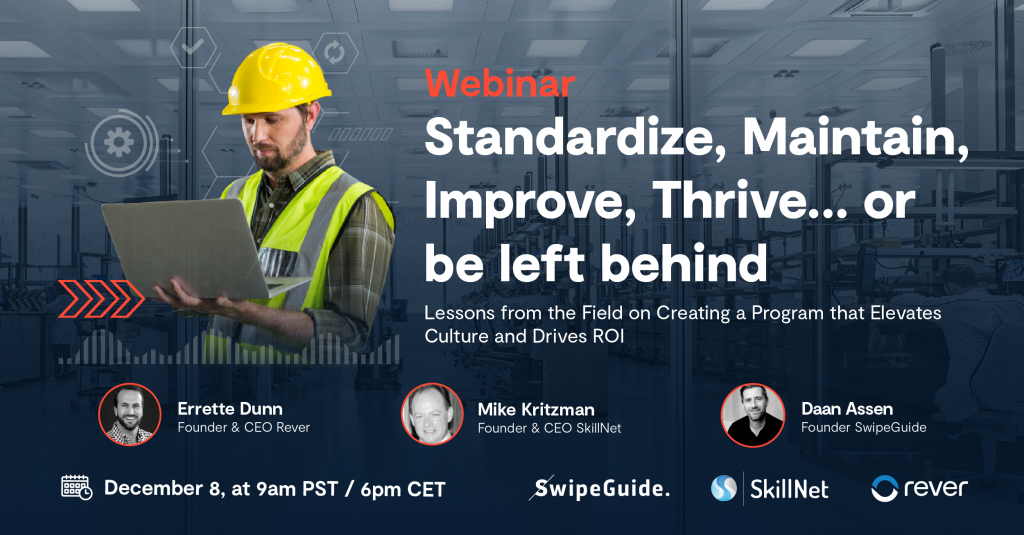Series (5/6): Leveraging the Power of Technology
4 minutes, 37 seconds read

Learn more about, and connect with, our presenters on LinkedIn:
Errette Dunn, Founder & CEO Rever (learn more about Rever)
Daan Assen, C0-founder SwipeGuide (learn more about SwipeGuide)
Mike Kritzman, Founder & CEO SkillNet (learn more about SkillNet)
Host: Ralf VonSosen, Chief Solution Office, Rever
In this segment, we examine the impact technology has had on frontline operations. Specifically on the kind of insights that can be created and how it can impact management and operational performance.
Watch here! See the live discussion.
Ralf VonSosen:
We’ve talked about technology as an enabler for a lot of these things. Technology allows us to gather a lot of information, normalize that information, and then get certain insights from that information. I’m really curious to get some things that you’ve observed in your customers, how they’ve taken some of these new unique insights and transformed them into things that in a very pragmatic way, improved the performance of the company.
Daan Assen:
Technology is of course very exciting because it captures data and provides insights. For us, that would be mainly looking at the relationships between the knowledge that you capture in the digital standard work and how that relates to performance. To give you an example, if you document the standards around a packaging line, in a food and beverage company, like Heineken, you can capture that body of knowledge across global operations and validate the knowledge together with the frontline, with engineers, with quality management. So we know that at some point we have a good quality standard work available, and we let that travel the world.
We have different breweries where we utilize the knowledge and we then analyze the data. Data on how is the knowledge used in the daily operations, and how does that relate to the performance of that packaging line, say in Belgium, in Singapore, in Mexico. You can get a lot of new insights on how the quality and use of knowledge can impact the performance on the shop floor. We have a lot of measurements, data, and insights that we provide our customers on how their knowledge base and the use of that knowledge base impacts productivity, efficiency, and safety in the workplace. So I think there’s a lot of exciting stuff that you can get out of technology and the data that it generates.
Ralf VonSosen:
That’s great. Errette?
Errette Dunn:
How can companies use insights to improve performance? One of the most common things I see is that companies get really excited about technologies, like IoT, in industrial settings. They put sensors in the devices and they capture a lot of data and they’re super excited about the data they’re gathering. And then they don’t know what to do with the data. They archive the data every three months and hopefully it will serve in the future for some sort of post mortem. That’s throwing great data into the trash because if you don’t use it almost immediately, you will probably never use it.
What is more valuable than data? Knowledge. Your people have a ton of knowledge, and by not tapping into that knowledge, you’re also doing the same thing. You’re throwing knowledge, which is much more valuable to the trash. So how can you use that knowledge that is trapped in the head of your people? If your organization knew what it really knows it would be unstoppable. So how can you tap into that? This is often very unstructured data sets by the way, that information that is in people’s heads. But there are ways, like the ways and tools, that are being discussed here, that can turn that very unstructured data into a structured data set from which you can derive insights. Insights that will help you drive up performance, improve quality, improve maintenance, and improve the skills and the retention of your people.
Ralf VonSosen:
Great. Mike?
Mike Kritzman:
The team with the most skills wins. How quickly can you adapt people from not knowing what they’re doing to mastery level fuels retention, high quality products, output, cross training, and all of these things eventually find their way to the balance sheet of companies that are striving to be profitable.
Ralf VonSosen:
I spent part of my career working in the IoT sector, providing building and manufacturing management with IoT. One of the things that I like to say is, what about the IOP? What about the internet of people? Being able to really tap into the knowledge, the experience and the information and people observe and have? Transforming that into trends, patterns, knowledge, and actions that are usually time sensitive.
Read more from this wonderful discussion:
- Adjusting Operations to the Ongoing Pandemic (1 of 6)
- Power of Standardization and Standard Work (2 of 6)
- Driving Continuous Improvement (3 of 6)
- Building and Managing Skills (4 of 6)
- Leveraging the Power of Technology (5 of 6)
- Advice for 2022 – It’s about your people (6 of 6)
OR, watch the Video Recordings (each is 5-10min in length):
- Adjusting Operations to the Ongoing Pandemic (1 of 6)
- Power of Standardization and Standard Work (2 of 6)
- Driving Continuous Improvement (3 of 6)
- Building and Managing Skills (4 of 6)
- Leveraging the Power of Technology (5 of 6)
- Advice for 2022 – It’s about your people (6 of 6)
Like this content? Sign up for our Newsletter
[hubspot type=form portal=561211 id=fda6d445-739e-4072-8dae-68b94971a266]THE FRONTLINE DOJO
More Articles
How to develop the next billion Knowledge Workers
3 minutes, 51 seconds read
Digital transformation in manufacturing is not what you think it is
10 minutes, 36 seconds read
The human side of change management: lessons learned from Toyota, Airbus, and Silicon Valley
1 minute, 28 seconds read
The true meaning of Genchi Genbutsu
3 minutes, 5 seconds read
